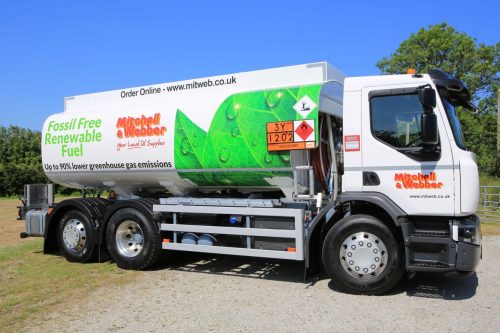Fuel distributor gets funding to reduce carbon emissions

Cornwall-based fuel distributor Mitchell and Webber Limited is reducing its carbon emissions and improving its renewable fuel offering, thanks to support from Lloyds Bank.
Mitchell and Webber supplies fuel to a variety of customers for a range of applications, including domestic heating.
As part of its sustainability efforts, the company sought to invest in its fleet to ensure the delivery of hydrotreated vegetable oil (HVO) fuel is as carbon efficient as possible. This goal was achieved through the purchase of three HVO renewable fuel tractor units, which were financed through a six-figure hire purchase and Lloyds Bank’s Clean Growth Financing Initiative. This initiative offers discounted lending to support measures aimed at reducing a business’s environmental impact.
In recent years, the demand for low carbon heating has experienced steady growth, driven by an increasing number of customers aiming to futureproof their homes in line with the UK’s net zero by 2050 target. Recognising this trend, Mitchell and Webber has been at the forefront of using renewable HVO fuel in oil fired boilers, which can result in up to a 90 per cent decrease in CO2 greenhouse gas production compared to traditional fossil fuels.
These vehicles will be utilised for transporting fuels including HVO to their depots and customers across the South West region while operating on the same fuel, aiding Mitchell and Webber in lowering its own carbon emissions.
In 2020, Mitchell and Webber became the first company in England to conduct a trial of HVO in a property. Since, it has been actively raising awareness of its effectiveness as an immediate and affordable solution for decarbonising home heating and ultimately, intends to transition its entire oil offering to fossil-free fuel for heating.
Robert Weedon, managing director for Mitchell and Webber Limited, said: “Since the UK announced its net zero by 2050 target nearly five years ago, the industry has witnessed a growing demand for low carbon heating alternatives. While technologies like heat pumps are available in the market, we have found that the greatest advantages of HVO in our customers trials are its affordability and the ease with which existing heating systems can be converted to use this fossil-free fuel.
“As a business, we’ve been supplying oil for more than 130 years but thanks to the support from Lloyds Bank, we have been able to make renewable investments in our own fleet, demonstrating our commitment to sustainability within the business, while also providing customers with a low carbon alternative to fossil fuels.”
Paul Collings, relationship director at Lloyds Bank, said: “We have had a long-standing relationship with Mitchell and Webber, spanning more than 100 years, and it’s been brilliant to see how one of our oldest clients has continued to evolve with, and sometimes ahead, of the industry.
“Mitchell and Webber is a company that champions sector innovation and supports its customers. Its investment in the decarbonisation of its fleet, using the same methods it provides to customers, really highlights the commitment of the business to its low-carbon offerings. We look forward to supporting like-minded businesses in the future.”









